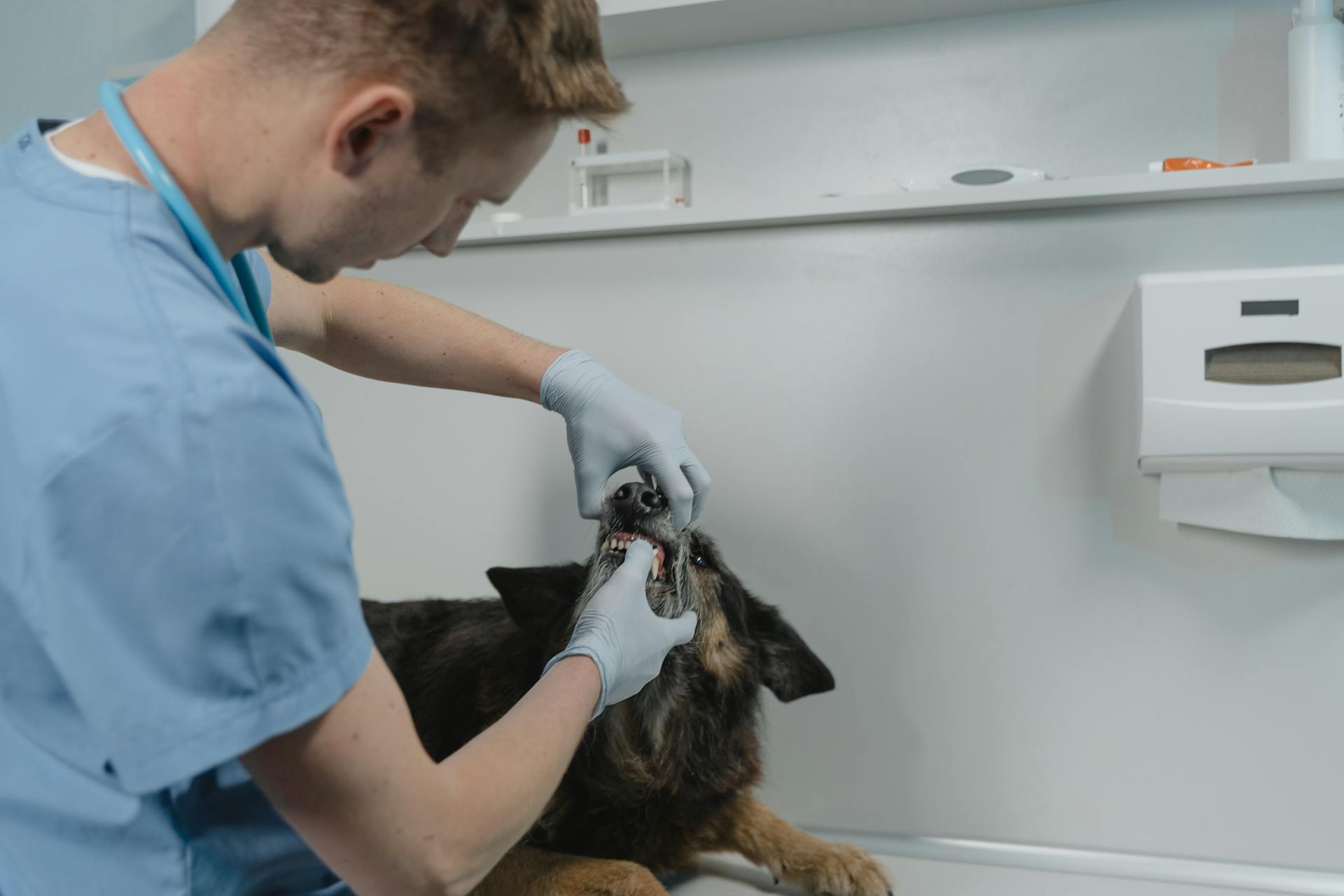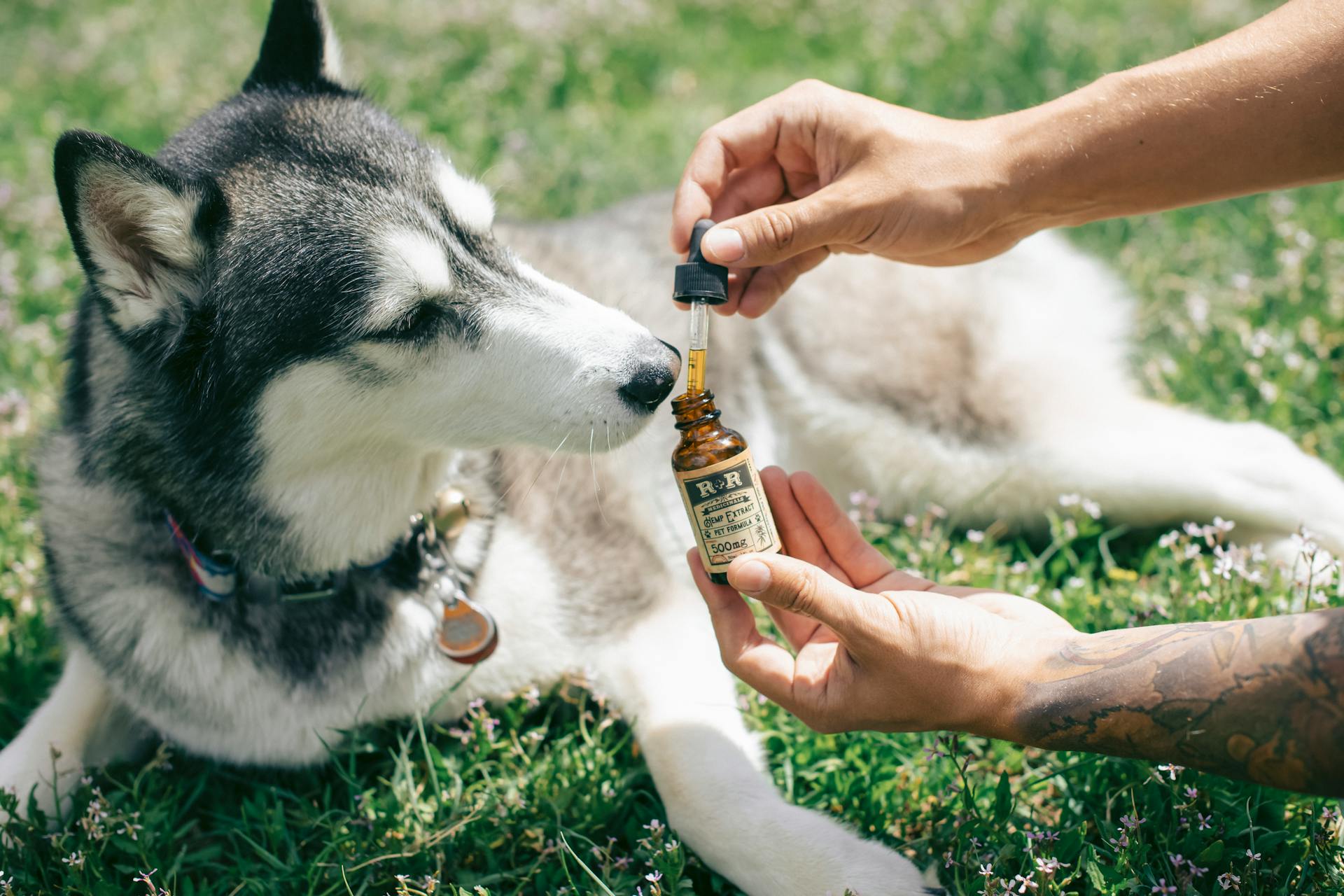
Weimaraners are a breed prone to certain health issues, and understanding these can help you provide the best care for your furry friend.
Hip dysplasia is a common issue in Weimaraners, with a significant percentage of the breed affected by this genetic condition.
Weimaraners are also at risk for bloat, a life-threatening condition that requires immediate attention.
Regular exercise and a balanced diet can help prevent bloat, so make sure to keep your Weimaraner active and fed well.
Gastric torsion, a complication of bloat, is another serious concern for Weimaraners, and prompt veterinary care is essential if symptoms arise.
As with any breed, regular veterinary check-ups can help identify potential issues early on, giving you a chance to address them before they become major problems.
See what others are reading: American Bully Care
General Health Information
Brushing your Weimaraner's teeth daily will prevent periodontal disease.
Regular dental care is crucial for your Weimaraner's overall health, as bad breath, red gums, and broken teeth can be signs of tartar build-up.
It's essential to monitor your Weimaraner's appetite and water consumption, as a change in either could be a sign of a serious issue.
Weimaraners are prone to itchy skin, so be on the lookout for scratching, chewing, or licking, as well as hair loss.
If your Weimaraner is lethargic, mentally dull, or excessively sleeping, it could be a sign of a underlying problem.
A change in behavior, such as fearfulness or aggression, can be a warning sign that your Weimaraner needs veterinary attention.
Monitor your Weimaraner's body for any lumps or bumps, regardless of size, as these can be a sign of a serious issue.
Here are some common signs of potential health issues in Weimaraners:
- Change in appetite or water consumption
- Tartar build-up, bad breath, red gums, or broken teeth
- Itchy skin (scratching, chewing, or licking), hair loss
- Lethargy, mental dullness, or excessive sleeping
- Fearfulness, aggression, or other behavioral changes
- Lumps or bumps – regardless of size
- Dry, scaly, sometimes itchy hairless patches on face or paws
Dental and Skin Issues
Your Weimaraner is more likely to have problems with her teeth than other dogs, with 80% of all dogs affected by dental disease by age two. Regular teeth cleaning is crucial to prevent tartar build-up and infection of the gums and roots of the teeth.

If dental disease isn't prevented or treated, your Weimie will lose her teeth and be at risk of damaging her kidneys, liver, heart, and joints, potentially cutting her life span short by one to three years. Weimaraners are more prone to dental disease, so it's essential to keep those pearly whites clean.
Skin infections and diseases are also common in Weimaraners, with yeast infections like Malassezia dermatitis causing itching, redness, and brown waxy discharge in the ears, and greasy, hairless areas on the skin with a characteristic odor.
Curious to learn more? Check out: German Shorthaired Pointer Skin Problems
Dental
Dental disease is the most common chronic problem in pets, affecting 80% of all dogs by age two. Unfortunately, Weimaraners are more likely than other dogs to have problems with their teeth.
Tartar build-up on the teeth is the starting point of dental disease, which can progress to infection of the gums and roots of the teeth. Regular cleaning of your dog's teeth is essential to prevent or treat dental disease.
Take a look at this: Dental Health Diets for Dogs
If dental disease is left untreated, your dog will lose their teeth and be in danger of damaging their kidneys, liver, heart, and joints. In fact, their life span may be cut short by one to three years.
We'll clean your dog's teeth regularly and let you know what you can do at home to keep those pearly whites clean.
Mange
Mange is a common issue in Weimaraners, caused by an overabundance of Demodex mites that live in the hair follicles of dogs. These mites are normally kept in check by a dog's immune system, but some breeds like Weimies develop an overabundance.
In mild cases, you may notice a few dry, irritated, hairless lesions on your dog's face or feet, which may or may not be itchy. Secondary skin infections can occur.
Prompt veterinary care is essential to keep the disease from getting out of hand. Many pets seem to outgrow the problem, while others require lifelong management.
Skin Infections
As a Weimaraner owner, you're probably aware that skin infections can be a real nuisance for your furry friend. Skin Infections caused by yeast, such as Malassezia dermatitis, can lead to itching, redness, and a characteristic odor.
The symptoms can be quite unpleasant, including greasy, hairless areas on the neck and throat. If left untreated, skin infections can cause your Weimie to become itchy and uncomfortable.
Weimaraners are also prone to pododermatitis, a painful skin infection of the feet. This condition causes blisters and ulcers between the toes, especially in pets with allergies.
If your dog is limping or licking his feet, check for redness, moisture, or skin abrasions. Early detection is key, so if you notice any of these symptoms, make an appointment with your vet right away.
Preventing skin infections is easier than treating them. Keeping your Weimie clean and well-groomed can go a long way in preventing skin issues. Regular check-ups with your vet can also help identify potential problems before they become serious.
On a similar theme: Bichon Frise Skin Problems
Skin Tumors
Weimaraner dogs are prone to certain types of skin tumors, most commonly hemangioma and hemangiosarcoma. If you detect any lumps in your dog's skin, go immediately to the vet for a check-up and diagnosis.
Hemangioma and hemangiosarcoma can be serious, so it's vital not to skip periodic check-ups in which the specialist may find any existing anomalies.
Mast cell tumors are a particularly nasty type of skin cancer found more often in Weimaraners. They often look just like other kinds of skin lumps and lesions.
All suspicious lumps should be tested and any questionable lump should be surgically removed as soon as possible. Many cancers are cured by surgically removing them, so early detection and removal is critical.
Recommended read: Why Do Yorkshire Terriers Lick so Much
Infections and Parasites
Weimaraners are susceptible to bacterial and viral infections such as parvo, rabies, and distemper. These infections can be prevented through vaccination, which we will recommend based on the diseases we see in our area, heritage, and other factors.
Many of these infections can be prevented with proper vaccination, but it's essential to stay on top of regular check-ups and testing to catch any potential issues early on.
All kinds of worms and bugs can invade your Weimaraner's body, inside and out, including fleas, ticks, ear mites, hookworms, roundworms, heartworms, and whipworms. These parasites can be transmitted to you or a family member and are a serious concern for everyone.
Regular testing and preventive medication can help keep your Weimaraner healthy and prevent the transmission of parasites to you and your family.
Bleeding Disorders
There are several types of inherited bleeding disorders that can occur in dogs, ranging in severity from very mild to very severe.
Many times, a pet seems normal until a serious injury occurs or surgery is performed, and then severe bleeding can result.
Von Willebrand's disease is a blood clotting disorder frequently found in Weimaraners.
We'll conduct diagnostic testing for blood clotting time or a specific DNA blood test for Von Willebrand's disease or other similar disorders to check for this problem before we perform surgery.
If this caught your attention, see: English Bulldog Soft Palate Surgery
Infections
Weimaraners are susceptible to bacterial and viral infections, the same ones that all dogs can get. These infections include parvo, rabies, and distemper.
Many of these infections are preventable through vaccination. Vaccination is a crucial step in protecting your Weimaraner's health.
We will recommend a vaccination schedule based on the diseases we see in our area, heritage, and other factors. This ensures that your Weimaraner receives the necessary protection against common infections.
Preventing infections is key to keeping your Weimaraner happy and healthy. Regular check-ups and vaccinations can go a long way in preventing infections.
Parasites
Parasites can invade your dog's body in many ways, including through contaminated soil, unclean water, or bites from infected mosquitoes.
Fleas, ticks, and ear mites can infest your dog's skin and ears, causing discomfort and pain.
Hookworms, roundworms, heartworms, and whipworms can get into your dog's system, leading to serious health issues.
These parasites can be transmitted to you or a family member, making them a serious concern for everyone in your household.
Regular testing is essential to detect parasites in your dog's body, and preventive medication may be necessary to keep them healthy.
For example, hookworms can be transmitted to humans through contact with contaminated soil or feces, so it's crucial to take precautions when handling your dog's waste.
Expand your knowledge: Boston Terrier Body
Mast Cell Tumor
Mast Cell Tumors are a type of skin cancer found more often in Weimaraners.
These tumors are particularly nasty and should be surgically removed as soon as possible.
They often look just like other kinds of skin lumps and lesions, some of which are harmless and others not.
All suspicious lumps should be tested and any questionable lump should be surgically removed right away.
Early detection and removal is critical because many cancers can be cured by surgically removing them.
Weimaraner owners should be on the lookout for any lumps in their dog's skin and go to the vet immediately for a check-up and diagnosis.
It's vital not to skip periodic check-ups, as the specialist may find any existing anomalies.
Related reading: American Bully Dog Skin Problems
Joint Problems
Weimaraners are prone to several joint problems that can cause discomfort and pain. One common issue is patellar luxation, where the kneecap slips out of place, often accompanied by a hopping or skipping gait.
Growing Weimies can suffer from a painful inflammation of the long bones in the legs, known as eosinophilic panosteitis or pano. This condition usually starts between six to ten months of age and shifts from leg to leg.
Weimaraners can also be affected by hip and elbow dysplasia, which occur when the bones of the associated joint don't form properly. This leads to laxity or instability within the joint, causing degenerative changes of the bone called osteoarthritis.
Dogs with hip dysplasia may not show signs of discomfort in younger years, but lameness and weakness may become more pronounced as they mature. Radiographs, or X-rays, can help identify dysplasia.
Hip and elbow dysplasia can result in a slight limp, but in severe cases, it can lead to complete disability of the affected part.
A unique perspective: American Bully Back Leg Problems
Eye and Heart Issues
Weimaraners are prone to several eye and heart issues that can impact their quality of life. Weimaraners can inherit or develop eye conditions such as cataracts, cherry eye, and distichiasis, which can be extremely painful and even lead to blindness if not treated promptly.
For another approach, see: Are Weimaraners Smart
Cherry eye is a condition where the gland in the third eyelid becomes sore or swollen, causing a red blob in the corner of the eye. It's more common in puppies or young Weimies and can occur suddenly in one or both eyes.
Distichiasis is a condition caused by extra hairs growing inside the eyelid and rubbing against the surface of the eye, leading to corneal ulcers and chronic eye pain. Untreated, these abnormal hairs can cause significant discomfort, but treatment options are available and the prognosis is good once the hairs are removed.
As for heart issues, Weimaraners can be born with heart defects that affect the structure of the heart's dividing wall or vessels, or cause problems with the electrical signals that control the heartbeat. These defects can lead to symptoms such as tiring easily, coughing, a swollen belly, or fainting.
On a similar theme: Can Dogs Sense a Heart Attack
Eye Problems
Eye problems can have a dramatic impact on your dog's quality of life. Weimaraners are particularly prone to several eye conditions that can cause blindness and chronic pain if left untreated.
Cataracts are a common issue in Weimaraners, where the lens of the eye becomes cloudy, affecting vision. This condition can be treated with surgery.
Cherry eye is a painful condition where the gland in the third eyelid becomes inflamed, causing a red blob to appear in the corner of the eye. It's more common in puppies and young Weimies.
If your Weimie develops cherry eye, your veterinarian may treat it with ointment first, but surgery is often the best option.
Distichiasis is a painful condition caused by extra hairs growing inside the eyelid, rubbing against the surface of the eye. This can cause corneal ulcers and chronic eye pain if left untreated.
Entropion is a condition where the eyelid rolls inward, causing the eyelashes to rub against the cornea. This can be extremely irritating and painful, and can ultimately lead to blindness if not treated.
Heart
Weimaraners are prone to heart disease, which can be born with a variety of heart defects.
Some of these defects affect the structure of the heart's dividing wall or the vessels, while others can cause problems with the electrical signals that control the heartbeat or with heart valve function.
We'll pay special attention to your Weimie's heart during each examination because of the significant risk of heart disease.
If we hear a heart murmur or you notice any unusual symptoms such as tiring easily, coughing, a swollen belly, or fainting, special testing will be recommended.
Neurological and Bloat Issues
Weimaraners are prone to certain health issues that can be serious and even life-threatening if left untreated.
Gastric Dilatation and Volvulus, also known as Bloat, is a condition where the stomach twists on itself and fills with gas, cutting off blood supply to the stomach and sometimes the spleen.
Your Weimaraner may retch or heave, act restless, have an enlarged abdomen, or lie in a prayer position if they're experiencing Bloat.
You might like: How to Prevent Twisted Stomach in Dogs
Preventive surgery can be an option to prevent Bloat, but if you see symptoms, take your pet to an emergency hospital immediately.
Weimaraners are also at risk for neurological conditions such as wobbler disease or wobbler syndrome, which causes a wobbly, drunken gait due to a narrowing of the vertebrae in the neck.
Degenerative Myelopathy is another neurological condition that affects Weimies more frequently than other breeds, causing weakness and poor nerve function in the hind legs.
Hemophilia A and Von Willebrand's Disease
Weimaraner dogs are prone to two inherited blood clotting conditions: Hemophilia A and Von Willebrand's disease. These conditions can cause serious bleeding issues.
Hemophilia A is a genetic problem that affects blood clotting, particularly in Weimaraner dogs. It makes it difficult for them to stop bleeding.
If your Weimaraner has Hemophilia A, you must take them to the vet promptly if they suffer a wound. The vet will need to administer specific medication to stop the bleeding.
Von Willebrand's disease is another genetic problem that affects blood clotting in Weimaraner dogs. It also causes difficulty in stopping bleeding.
The severity of Von Willebrand's disease can range from mild to severe cases.
Neurological
Neurological issues can be a concern for Weimaraner owners, and it's essential to be aware of the potential risks.
Wobbler disease, also known as wobbler syndrome, can cause a wobbly, drunken gait in Weimaraners due to a narrowing of the vertebrae in the neck.
This condition pinches the spinal cord and associated nerves, affecting the dog's ability to feel their feet.
The first signs of wobbler disease often include unstable hind legs, stumbling, and sometimes falling.
Medications, neck braces, rehabilitation exercise programs, and surgery are treatment options available for wobbler disease.
Degenerative Myelopathy is a neurologic condition similar to ALS or Lou Gehrig's Disease in people, causing weakness and poor nerve function in the hind legs.
It affects Weimies more frequently than other breeds and can lead to paralysis in the hindquarters, along with incontinence.
While there is no cure for Degenerative Myelopathy, rehabilitation, exercise, acupuncture, and dietary supplements can be helpful.
A genetic test is available to determine whether your dog is at risk for this heritable disease.
You might like: How Much Exercise Does a Cavapoo Need
Bloat
Bloat is a serious condition that can be fatal if left untreated. Your Weimaraner is more at risk due to their deep, narrow chests.
Gastric Dilatation and Volvulus (GDV) or Bloat can occur in as little as 30 minutes if not treated immediately. Your dog may retch or heave, but little or nothing comes out.
Symptoms include acting restless, having an enlarged abdomen, or lying in a prayer position with their front feet down and rear end up. This is not a condition to take lightly.
Preventive surgery is an option to tack down or suture the stomach in place so it's unlikely to twist. This can be a lifesaver for your Weimaraner.
You might like: Little Dog Lifespan
Care and Lifestyle
Taking care of your Weimaraner's daily needs is crucial to preventing health issues. Brush her coat at least weekly to prevent matting and tangling.
Supervising your pet is essential, especially in the early stages of her life. Keep doors closed, pick up after yourself, and block off rooms as necessary to keep her out of trouble and away from objects she shouldn't put in her mouth.

A proper diet and exercise routine are vital to your Weimaraner's health. Feed a high-quality diet appropriate for her age, and exercise her regularly, but don't overdo it at first. She requires at least an hour of exercise every day.
Here are some essential care tasks to remember:
- Brush her coat at least weekly.
- Clean her ears weekly, even as a puppy.
- Brush her teeth at least twice a week.
- Supervise her at all times, especially in the early stages of her life.
Spay or Neuter
Spaying or neutering your Weimie is one of the best things you can do for her. It decreases the likelihood of certain types of cancers.
Spaying or neutering eliminates the possibility of your pet becoming pregnant or fathering unwanted puppies. This is a huge relief for many pet owners.
Performing the surgery also gives us a chance to identify and address some of the diseases your dog is likely to develop. Routine blood testing prior to surgery helps us to identify and take precautions for common problems that increase anesthetic or surgical risk.
If your pet needs hip X-rays or a puppy tooth extracted, this would be a good time to do it while they're under anesthesia. It's convenient for you and easy for your pet.
Take a look at this: Preventative Care Keeping Your Pet Healthy Year-Round
Care and Lifestyle

Caring for a Weimaraner requires attention to her diet, exercise, and overall well-being. It's essential to watch her diet and make sure she gets plenty of exercise.
Brushing her coat and teeth regularly is crucial for her health. Brush her coat at least weekly and her teeth at least twice a week to keep them perfect.
Weimaraners need regular ear cleaning, even as puppies. Clean her ears weekly to prevent any issues.
Exercise is vital for Weimaraners, who require at least an hour of exercise every day. This can be a combination of physical and mental stimulation.
Here are some essential care tips for your Weimaraner:
- Supervise your pet as you would a toddler and keep doors closed to prevent accidents.
- Feed a high-quality diet appropriate for her age and keep her diet consistent.
- Exercise your dog regularly, but don't overdo it at first to prevent injuries.
Sources
- https://ncweimaraner.org/health.html
- https://www.animalhealthcenternjwc.com/client-resources/breed-info/weimaraner/
- https://www.hepper.com/weimaraner-health-issues-vet-answer/
- https://sayrebrookvet.com/client-resources/breed-info/weimaraner/
- https://www.animalwised.com/common-diseases-of-weimaraner-dogs-1261.html
Featured Images: pexels.com


